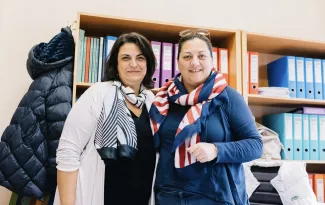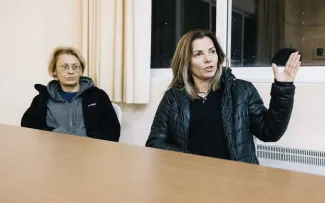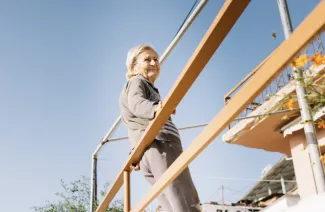Over the course of the 20th century, women in Greece achieved legal equality. This also changed traditional role models - but not everywhere with the same speed. Merle Klingenberg asked the women's organisation Eryfilli in the mountain village of Kryoneri on the Peloponnese how girls and women in rural areas can become politically active and what still needs to be done.
There is no shortage of rights to political participation in Greece either: women are legally equal to men and there are a number of equality laws in place to protect women from discrimination. The most eventful years were the 1980s, when civil marriage and the right to divorce were introduced and dowry was abolished, among other things. However, there are still gaps in the practical implementation of the laws: In terms of wages and salaries, there is a gap of up to 15 per cent between women's and men's incomes, according to figures from Eurostat. In addition, women are much less likely to hold management positions. In rural areas in particular, women have to contend with stereotypical role expectations when it comes to housework, bringing up children or care work. Last but not least, this is also linked to the traditional Christian image of the family and the strong role of the Orthodox Church. What's more, the coronavirus pandemic has further exacerbated inequality.
Women are not visible enough in public discourse
In many professions, such as healthcare, engineering, the judiciary and the media, there is already a balanced gender ratio, in some cases even at board level. However, women play too small a role in public discourse. Women are also still heavily underrepresented in politics in Greece. Even though President Katerina Sakellaropoulou is a woman, this is not representative of the country.
Of the 300 seats in the Greek parliament, only 60 are occupied by women - that corresponds to a share of 20 per cent. The proportion of women in the cabinet of Prime Minister Kyriakos Mitsotakis is also very low: only ten of the 58 members are female - only two of whom hold ministerial rank. The main reasons for this are the lack of promotion of women's participation, widespread stereotypes, prejudices and phenomena such as "mansplaining", according to Deutsche Welle, for example.
Participation is the key
There are also major differences between urban and rural areas, I learn in the Peloponnese. In 2019, the women's association "Erifylli" was founded in the small mountain village of Kryoneri. Such associations bring together women who want to promote social concerns or women's issues. The first women's associations were established from 1810 onwards, modelled on the French maternity societies, and were introduced in the cities of Prussia under French administration.
Vaso Bouziani and Maria Koufopoulou from the women's association talk about everyday life and the disadvantages faced by women in the region, which they want to raise awareness of through the association. When coronavirus came along, activities had to be put on hold for a while - but the association's board has been meeting weekly again since February 2022. Once a month, there is also a general meeting of the 62 members, report the two board members. They are still struggling with funding and the lack of a basic room
They say that while the men work in the fields and are not involved at home, the women have both field and housework on their programme. Many of the women are therefore farmers, housewives, mothers and cooks at the same time, but receive little or no recognition for this.
A question of visibility
Both women emphasise that girls and women must become socially and politically active in order for things to change. In the village, men call the shots and are therefore also socially visible. In order to correct this imbalance, women must first of all develop more self-confidence. However, young women in particular feel fear and don't know how to behave. This starts in the family, as fathers often dictate how their daughters should behave, they say. Vaso Bouziani speaks of a role problem: women are often too afraid to assert themselves and follow social rules such as the command "You must learn to cook". Too few have claimed their place in society so far.
So what to do? The organisation has set itself the goal of further developing the country and pushing the boundaries of participation for girls and women. For example, they want to attract more tourists and guests and keep the locals in the village - the exodus of young people is a major problem in the area. One of their ideas is for women from the village to sell local products such as wine or cakes at a stall organised by the association. And who knows, maybe the idea will spread to other villages?
This is a translation of the original article. Read the original article here: https://agorayouth.com/2023/03/13/gleichberechtigung-in-griechenland-warum-besonders-frauen-auf-dem-land-politisch-aktiv-werden-mussen/



